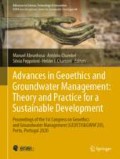Abstract
The present work presents two databases available in Brazil related to groundwater governance applications, exposing their applicability, gaps and potential geoethical discussions. The first database is the Rural Environmental Registry (CAR), which is a national electronic public record, mandatory for all rural properties. The second database is the Groundwater Information System (SIAGAS) developed by the Geological Survey of Brazil (CPRM), which consists of a continuously updated database of wells. CAR has a record of 1,892,067 water springs located within rural properties and SIAGAS has 322,922 registered wells. Publicity of CAR data is ensured by law. Both are public databases, so their use does not generate legal conflicts. CAR data is self-reported (by landowners) and requires validation by the government. For this reason, its use currently requires care to avoid distortions caused by errors in the georeferencing of springs. SIAGAS also has a small number of wells registered, and it is estimated that 88% of wells in Brazil are clandestine. SIAGAS and CAR are examples of databases of great applicability to groundwater governance, both by government initiatives, which require validation and improvements in order to be expanded and applied with greater reliability.
Access this chapter
Tax calculation will be finalised at checkout
Purchases are for personal use only
References
ANA (National Water Agency) (2019) SDG 6 in Brazil: ANA’s vision of the indicators. Brasília, National Water Agency
Bellaubi F, Bustamante R (2018) Towards a new paradigm in water management: Cochabamba’s water agenda from an ethical approach. Geosciences 8:177
CPI and Agroicone (2018) The Brazilian Forest Code finally can be implemented. What’s next? https://www.inputbrasil.org/wp-content/uploads/2018/03/CPI_Agroicone_Insights_Forest_Code_-_Whats_Next.pdf. Last accessed 2020/04/11
Hirata R, Suhogusoff AV, Marcellini SS, Villar PC, Marcellini L (2019) A revolução silenciosa das águas subterrâneas no Brasil: uma análise da importância do recurso e os riscos pela falta de saneamento. São Paulo, Trata Brasil
Kemper KE (2007) Instruments and institutions for groundwater management. In Giordano M, Villholth KG (2007) The agricultural groundwater revolution: opportunities and threats to development. Cambridge, CABI
Limaye S (2017) Socio-hydrogeology and low-income countries: taking science to-rural society. Hydrogeol J 25(7):1927–1930
Llamas MR (2003) Ethical Considerations in water management systems. Water Nepal 10(1):15–33
Mogk DW, Bruckner MZ (2020) Geoethics training in the Earth and environmental sciences. Nat Rev Earth Environ 1:81–83
Peck J (2007) Groundwater management in the High Plains Aquifer in the USA: Legal problems and innovations. In Giordano M, Villholth KG (eds) The agricultural groundwater revolution: opportunities and threats to development. Cambridge, CABI
Re V (2015) Incorporating the social dimension into hydrogeochemical investigations for rural development: the Bir Al-Nas approach for socio-hydrogeology. Hydrogeol J 23(7):1293–1304
Schlager E (2007) Community management of groundwater. In Giordano M, Villholth KG (2007) The agricultural groundwater revolution: opportunities and threats to development. Cambridge, CABI
SFB. CAR Bulletin. https://www.florestal.gov.br/documentos/car/boletim-do-car/4418-revisao-boletim-car-encaminhar-07abril2020-1/file. Last accessed 2020/04/11
SIAGAS. Sistema de Informações de Águas Subterrâneas, https://siagasweb.cprm.gov.br/layout/index.php. Last accessed 2020/04/11
Walker WE, Loucks DP, Carr G (2015) Social responses to water management decisions. Environ Process 2:485–509
Author information
Authors and Affiliations
Corresponding author
Editor information
Editors and Affiliations
Rights and permissions
Copyright information
© 2021 Springer Nature Switzerland AG
About this paper
Cite this paper
Silva, C.O.F., Manzione, R.L. (2021). Public Geospatial Data for Groundwater Governance: The Brazilian Case. In: Abrunhosa, M., Chambel, A., Peppoloni, S., Chaminé, H.I. (eds) Advances in Geoethics and Groundwater Management : Theory and Practice for a Sustainable Development. Advances in Science, Technology & Innovation. Springer, Cham. https://doi.org/10.1007/978-3-030-59320-9_12
Download citation
DOI: https://doi.org/10.1007/978-3-030-59320-9_12
Published:
Publisher Name: Springer, Cham
Print ISBN: 978-3-030-59319-3
Online ISBN: 978-3-030-59320-9
eBook Packages: Earth and Environmental ScienceEarth and Environmental Science (R0)

